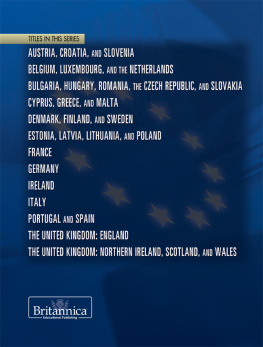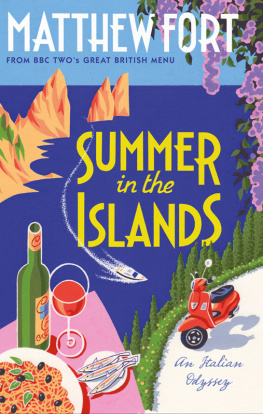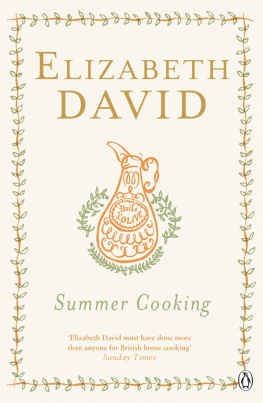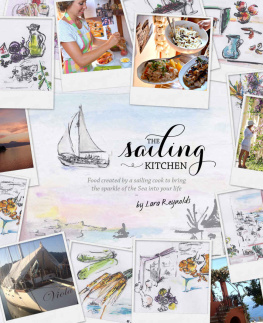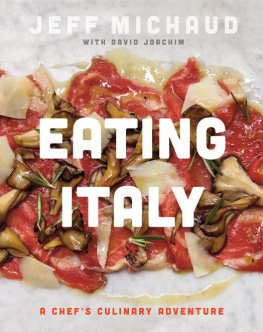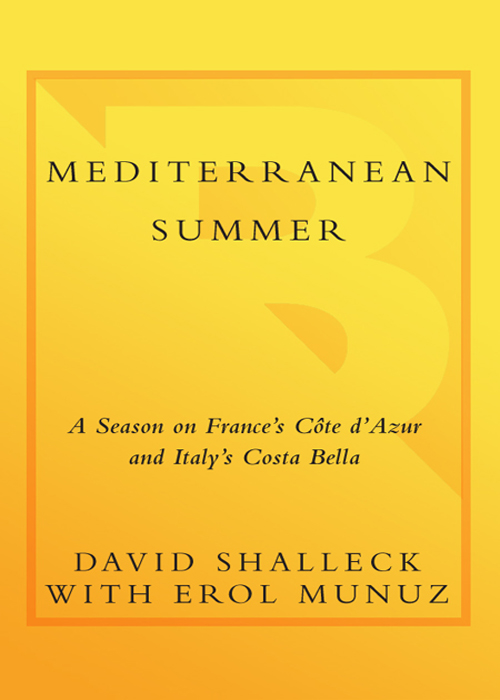
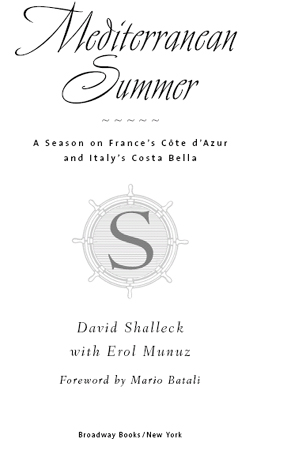
Contents
Two A Season to Taste
Antibes and the Bay of Angels
Three The One Without the Tan
Cap dAntibes and the Estrel Coast
Four Truth in Numbers
Saint-Tropez
Five Spaghettoni
Monte Carlo
Six Sea Dates
Portofino and the Italian Riviera
Seven Why Is the Risotto Black?
Viareggio, Forte dei Marmi, and Elba
Eight The Battle of the Fishes
Porto Santo Stefano and the Argentario Coast
Nine August Ferie
Ischia, Ponza, Capri, and the Amalfi Coast
Ten Emerald Blues
Sardinia and the Emerald Coast
Eleven The Last Regatta
Corsica and the Cte dAzur
To my mother and father
D.S.
For my family
E.M.
Authors Note
Although I didnt know it at the time, the story I tell in Mediterranean Summer took root the day I decided to leave my steady restaurant job in the States to travel to France and Italy. I had set out to find an answer to what transforms one into a chef and at the same time had only a vague notion of the culinary discoveries I would make. Once abroad, I cooked during a few summers on a gorgeous classic sailing yachtthe main setting in this bookthat proved most significant in fulfilling my desire. I remain grateful to the owners for the opportunities they gave me when I was on board. For storytelling purposes, those seasons and actual events that occurred have been consolidated here into one summer at sea. Moreover, out of respect for the privacy of those involved, the names and many physical characteristics of the owners, my fellow crew members, the yacht, and other yachts in the story have been changed. Im grateful to all of those I encountered during my tenure abroad, many of whom appear in this narrative. I shall forever carry the wonderful experiences and lessons learned from what turned out to be a life-changing culinary journey on the Mediterranean.
David Shalleck
San Francisco
November 2006
Foreword
When my old friend, chef cohort, and comrade David Shalleck, whom Ive known for twenty years, asked me if Id write the foreword to his first book, I immediately responded positively. I expected a solid and interesting collection of recipes gathered and developed along his amazing journey throughout Europe from an American cooks point of viewspritzed with interesting anecdotes, spicy and zippy headnotes filled with tidbits of lore, and stories of the fun and hazards of cooking around the Mediterranean on a yacht. When he finished the manuscript several months ago he popped it in the mail, and I let it sit on my desk, confident I would whiz through it in a few minutes to get the feel of it and knock out a perfunctory testimonial to good cooking and experience in the real world.
Instead, I read the entire tale on a flight from New York to Paris on my way to Alba for a weekend of truffles and reacquaintance with Italy, as I do several times a year, and was struck by the many ways this timeless story echoes my own experiences. How delightful to find David had written real literature, with clear language, strong sentiment, his stories varied and funa book filled with sage cooking advice, travel anecdotes, and, most important, a young and vibrant voice chronicling the world from a delicious new perspective.
Like Heat, Down and Out in Paris and London, and Kitchen Confidential, Davids prose in this picaresque tale provides an intimate back-of-the-house look at the constant ride between the catastrophic and the successes of what is true life in a modern kitchen.
I first met David in San Francisco when he started at Campton Place under Bradley Ogden in the very middle of the California cooking revolution of the eighties. He had a New Yawk accent and a very East Coast sentiment about him but was all about the food and the style of the times. I was working at the Four Seasons Clift Hotel as a sous-chef, and most of my real pals at that time were sous-chefs or line cooks to the greats of the era such as my heroes Jeremiah Tower at Stars, Mark Miller at Fourth Street Grill, Judy Rodgers at Zuni, and Bradley at Campton Place. We had an informal kind of club and would meet at each others restaurants to try our cooking, snack together on days off, and stay up late after service talking incessantly about food, waiters, bartenders, farmers markets, wine, foie gras, and tacos. It was a time when we all learned to eat, to share, and to support each other. And this mutual admiration club continues even now. Looking around San Francisco, and the country for that matter, it is quite enjoyable to see how many of our peers have gone on to their own incredible and well-deserved successes: Mark Franz at Farallon, Loretta Keller at Coco500, Traci Des Jardins at Jardinire, Bruce Hill at Pico and Bix, Dave Robins at Chinois and Spago in Las Vegas.
From San Francisco, I moved first to Santa Barbara, and then on to my own grand tour in Italy, landing outside Bologna, infused with enthusiasm by Faith Heller Willingers writing and consulting her book Eating in Italy in every town of my journey. During this time, I lost direct contact with David. I traveled east to Turkey in search of Byzantine mosaics, then discovered a bit of the world of yacht crewing in Bodrum, and actually considered trying to find a job by visiting a crew agency in Antibes, France. With no luck in the offices, I hit the docks looking for the biggest and most beautiful boats in search of employment in a new environ. Knocking on the door of one of the most magnificent yachts in the whole port, I met an Australian deckhand who told me to wait a minute while he went to get the chef. Lo and behold, up from the galley emerged my old pal David. He was busy making a base for bouillabaisse, so we agreed to meet for a drink later that day. Many details of what eventually became this very book became clear in the midst of great celebration and much festivity over the next couple of evenings in Antibes.
So our entangled journey continued in Europe, both of us on our grand tour of Italy, kitchens, culture, and self. Several years later we met again in New York, when David was touring as a culinary television producer and chef, working the margins in his constant research of food, cooking, and the intellectual pursuit of the delicious.
This book is many things to meprimarily it is Davids excellent adventure and a joy to read for both style and content. But mostly I find it a wonderful barometer of what makes my generation of cooks and chefs so special: the thought processes, the constant improvement, and the delight of introspection in the face of remarkable and unique personal experience, a luxury to read about, but most important, to live.
Mario Batali
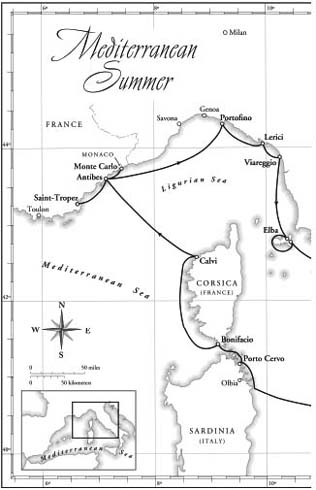

Serenity

T he dawns stillness is all around me as I start my exercises on the foredeck of Serenity.
Next page

